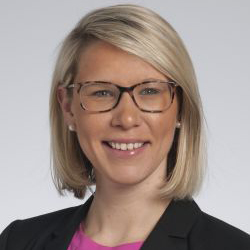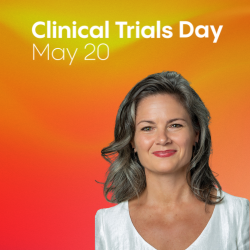The next time you bemoan an arduous informed consent procedure, you might want to sit down for a cup of coffee with Abby Statler, PhD, MPH, MA, CCRP, director of research quality and safety at Dartmouth-Hitchcock Medical Center.
Ask how Statler and her team handled the complex and important consent issue with patients suffering from COVID-19 as they helped open two Phase III COVID-19–related therapeutic studies. The Gilead-sponsored studies, one with patients with moderate COVID-19 and the other with patients suffering more serious symptoms, evaluated the safety and antiviral activity of Remdesivir (GS-5734™) against the condition.
For starters, the informed consent process involved quarantining the consent forms in biohazard bags.
“We couldn’t safely conduct informed consent” following traditional protocols, Statler recalls. Instead of being stymied, the team crafted legal, ethically sound, and innovative ways to meet the requirements without endangering patients or research staff.
“We worked with the nurses providing COVID-19 patients their care,” Statler says. “We would get the consent forms to the patients on lockdown, then sit outside a window and speak with them over the phone” to ensure they understood the various aspects of the clinical trial.
Further complicating matters, when research is conducted in New Hampshire, state laws indicate that no one may consent on behalf of another person for experimental treatment unless the procedure is approved by the probate court. This presented a unique challenge for Dartmouth-Hitchcock, as many severe COVID-19 patients were incapacitated and unable to personally consent to an experimental treatment.
In response, Dartmouth-Hitchcock supported a petition that ultimately resulted in legal action that permits an agent or surrogate to consent to clinical trials for COVID-19 treatment. This was pivotal for COVID-19 research conducted in the state of New Hampshire, Statler recalls. The unprecedented times evoked by the pandemic clearly challenged the traditional trajectory of research operations, but institutions staffed by innovative teams whose members are willing to urgently adapt processes can thrive under such circumstances, she adds.
“We’re proud as an institution of our success, especially given the challenges we faced,” Statler says. “We’re an academic medical center in a rural area” where it’s often difficult to reach patients living in remote conditions. “We were able to give these patients access to research studies” under very difficult circumstances, which truly supports the medical center’s patient-centered approach to care, she adds.
“COVID-19 has really highlighted research,” Statler says. “It’s put it in a positive spotlight.”
Author: Michael Causey



